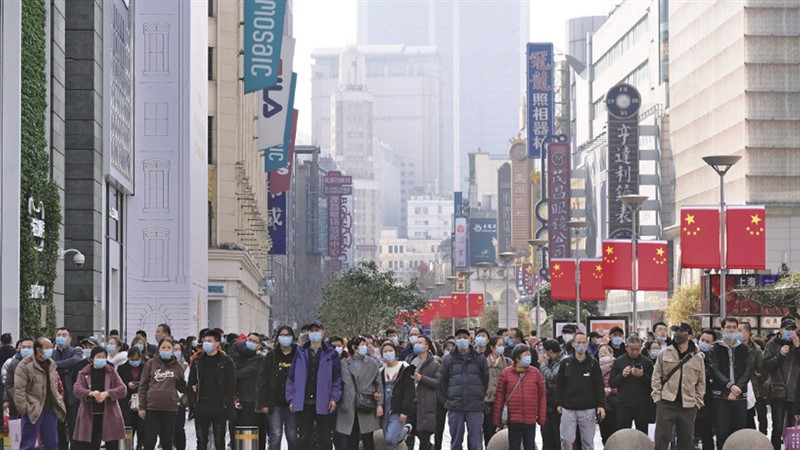2023.01 The Taiwan Banker NO.157 / By Alicia Garcia Herrero
China to surprise positively thanks to opening-up while the rest of Asia underwhelmsBanker's Digest
Such a fast increase is mainly due the lifting of its zero-Covid regulation which will lead to a jump in local services and possibly, although not so rapidly, tourism. China underperformed the rest of Asia in 2022 due zero-Covid measures as well as the further deterioration of the real estate sector. In contrast, the rest of Asia grew more than expected as it benefitted from opening up from Covid restrictions in different stages. Inflationary pressures remain relatively tamed compared to the West, especially in China. Domestic opening, tourism inflows, a favorable base and a surge of FDI boosted ASEAN growth to 5.5% in 2022 from 3.9%. China, instead, is expected to grow barely 3% in the same year. For the rest of Asia, which has completed its opening up, low hanging fruits for easy growth have been exhausted and financial conditions are expected to remain tight for most of 2023, in line with global financial conditions even if with some tailwinds from a weaker dollar. At the same time, demand in the US and EU is decelerating rapidly entering negative territory so that Asian economies – especially those that are more open to the world through trade and investment – are bound to be negatively impacted, such as Vietnam and South Korea. In addition, not only is the monetary space difficult but also the fiscal one. Fiscal policy will be more constrained in 2023 as debt service has increased. While China will do better, the support to the rest of Asia should be modest as China will not allow for its current account to suddenly enter into a big deficit. All in all, we expect Asia, excluding China, to slow to 3.1% in 2023 (although quite higher if weighted, namely 4.3%). China, instead, will increase its growth rate from 3% to 5.5%. Such a fast increase is mainly due the lifting of its zero-Covid regulation which will lead to a jump in local services and possibly, although not so rapidly, tourism. However, investment sentiment might remain weak especially if the reopening suffers from risk of reversal. Growth will not be as fast as in 2021, the year of recovery of the first Covid wave, because external demand will be much less favorable. At the sectoral level, faster pace of reopening in China will be a cyclical catalyst for travel, consumption and automotive sales, which strongly correlate to mobility changes. The real estate sector should also benefit from a milder regulatory environment, but sentiment will remain rather negative. The same is true for internet platforms as common prosperity remains an important mantra for the Chinese economy. Finally, structural demand for green and electric vehicles related sectors will be supported across Asia. Moving to the risks, the most relevant one should probably be a potential reversal in China’s currently fast opening from zero-Covid policies. A second relevant risk is a longer than expected war in Ukraine, or even an escalation into a nuclear threat or other venues. This could keep energy prices elevated for longer or even see a further increase. A third risk relates to the increasing strategic rivalry between the US and China which could generate a new crisis in the Taiwan straits and also push the rest of Asia to take sides. Against such backdrop, the risk of technological bifurcation becomes more real. Finally, regarding more localized risk, China’s real estate sector is not fully out of the woods as banks’ support is not enough to lift all developers and more defaults might come. Finally, local political risk is quite moderate in 2023 with elections in Thailand and a new government in Malaysia que needs to manage to remain in place. Against such backdrop, Taiwan has been lucky in 2022 as it has dodged a COVID-driven recession. Riding the tailwind of digitalization, Taiwan's export has continued its economic growth in the first half of the year, but things have changed for the worse since then, with the steepest negative growth in the last seven years last November. Supportive government policies have boosted FDIs in the green and high-tech manufacturing, but the real economic challenges have just begun with the global tech cycle downturn. Furthermore, households’ sentiment may fall as growth slows down. Another relevant factor is that Taiwan should see tourism income outflows, which could hover around 5.2% of GDP. With domestic and external headwinds, Taiwan's GDP grow is bound to slow in 2023, from 3.2% in 2022 to 2.6% in 2023. On a positive note, growth deceleration should help bringing inflation down as well, from 3.0% in 2022 to 1.9% in 2023. Finally, to strike a balance between growth and inflation, we should not expect many more hikes in Taiwan but, as the FED also reaches its peak in interest rates next March, the depreciation of the Taiwan dollar should also come to a halt in 2023.


